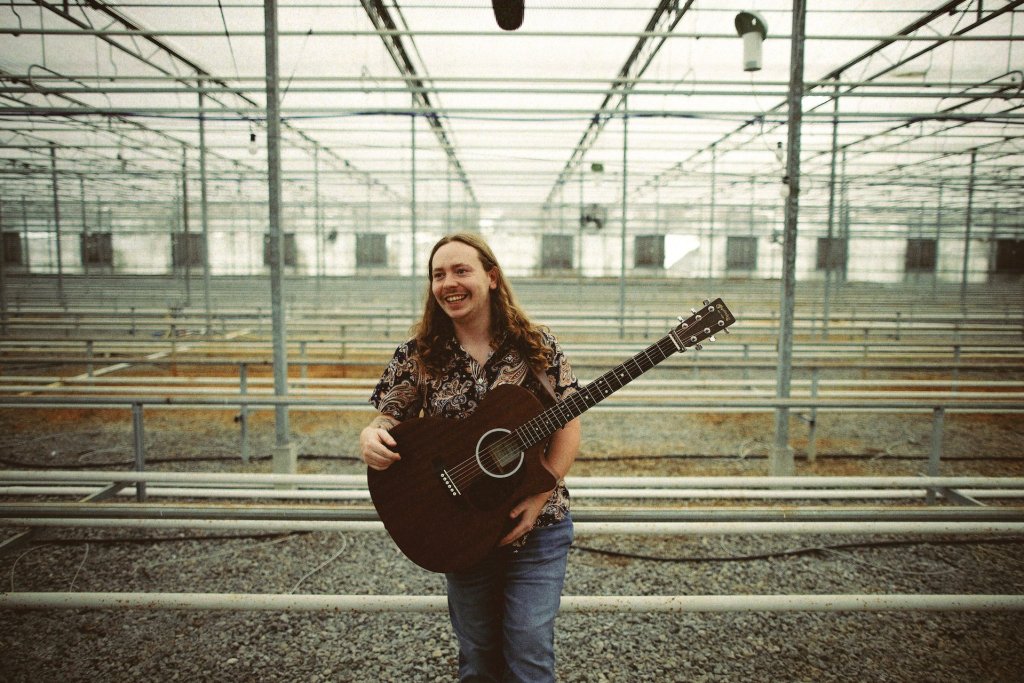Appalachian country music has seen a resurgence in the past decade thanks to artists such as Tyler Childers, Sturgill Simpson, Chris Stapleton and others. Their success has acted as a wrecking ball, knocking open a massive door of opportunity for not only themselves but also every other starving artist who calls the region home.
Videos by Wide Open Country
One of those artists benefiting has been Logan Halstead. The 19-year-old, hailing from near the West Virginia-Kentucky state line, champions the good and illuminates the bad of Appalachia with lyrics wise beyond his years on his long-awaited debut album Dark Black Coal. However, the album's 11 tracks are a far cry from the Pink Floyd, Metallica and Iron Maiden that consumed his youth.
"I grew up when Jason Aldean and Luke Bryan were topping the charts, so I never got too into mainstream country," Halstead tells Wide Open Country. "It wasn't until middle and high school that Sturgill [Simpson] and Tyler [Childers] started getting big. It was their music that reminded me it's alright to be from Appalachia."
Their music is also what pushed him into the country sphere, making the pivot when he was 15 to more of a country sound that was consuming the region. One of the first songs he wrote was the album's title track, "Dark Black Coal," which would prove to be a game changer. After recording the song — about the rugged and unforgiving nature of the coal industry — for a RadioWV YouTube session, the video went viral. It set off a chain of events that would send Halstead down a musical path for good. In the two years since its posting, the video has accumulated over 6 million views, helping to show the artist that there was, in fact, an interest in his music — something he never would've imagined just a few years prior.

IVPR
"I'd recorded a few cover videos for Facebook and played my guitar at house parties before, but none of it ever caught on like that video did," Halstead says. "I was a nobody until that video popped off. Suddenly, people were reaching out to book me. It didn't matter how much money they offered; as soon as I saw I could make money from music and singing, I left my house and began traveling around playing music."
The video caught the attention of Cole Chaney, another young, up-and-coming artist from Eastern Kentucky who has since turned into a mentor and one of Halstead's closest friends. Their bond is so close that Halstead even recorded Chaney's song "The Flood" for Dark Black Coal after Chaney overheard him playing it and urged him to include a version of it on the record. Referring to him as "quite possibly the most raw and talented person I've ever ran into," Chaney says that Halstead's authenticity is at the center of his quick rise and success.
"The most important part of being a songwriter is being honest about yourself, your story and where you come from, and Logan leans into that well," Chaney says. "He has an incredible voice and is so naturally gifted. He doesn't even have any formal training — he just showed up ready to party. He's really something else."
Both artists excel at portraying the beauty of Appalachia. For Halstead, there's no better evidence of that than songs such as "Mountain Queen" and "Kentucky Sky." Both channel picturesque imagery to describe the landscape, from winding rivers to rolling hills, low-down hollers and everything in between. According to Halstead, "Kentucky Sky" was inspired by childhood visits with his sisters in Northern Kentucky, trips he always cherished due to the change of pace compared to his usual family vacations to Myrtle Beach, South Carolina.
"I used to visit them in the summers to fish, and it just seemed like the sun never wanted to set," Halstead says. "That and the rolling hills were a huge inspiration for that song. I wanted to capture the natural beauty of Eastern Kentucky and Appalachia because, despite its problems, there really isn't a place more beautiful."
While Halstead is quick to highlight the good of Appalachia, he also doesn't shy away from the bad in his music. Songs such as "Man's Gotta Eat" and "Good 'Ol Boys With Bad Names" touch on food insecurity, poverty and drug addiction plaguing the area, all of which Halstead has experienced himself one time or another. His hope is that bringing attention to these issues will help to improve the situation for those around him and show folks that you can find success despite dealing with these struggles.

IVPR
"It really scared me growing up and seeing all these young kids getting into drugs, including myself for a bit," says Halstead. "I wanted to shine a light on it because it's a serious issue that needs addressing."
Although the success of artists coming before him helped to provide a platform on which he's built success, it's evident listening to Dark Black Coal that Halstead's immense talent and earnest songwriting were bound to break out sooner or later. His success has captivated Appalachia in a way few other artists have in recent years, and it shows no signs of slowing down. And if Halstead has any say, it'll help to change the narrative of the region in the process.
"I want my music to resonate with everyone, but especially with kids like me who grew up in small coal towns and didn't really think there was a way out," Halstead says. "It can be a hopeless feeling, so I wanted to shine a light on our area, both good and bad, in hopes that it helps someone else struggling to find peace."
READ MORE: Bruce Robison, Vincent Neil Emerson Talk Willie Nelson's Influence, The Next Waltz Tribute Album




